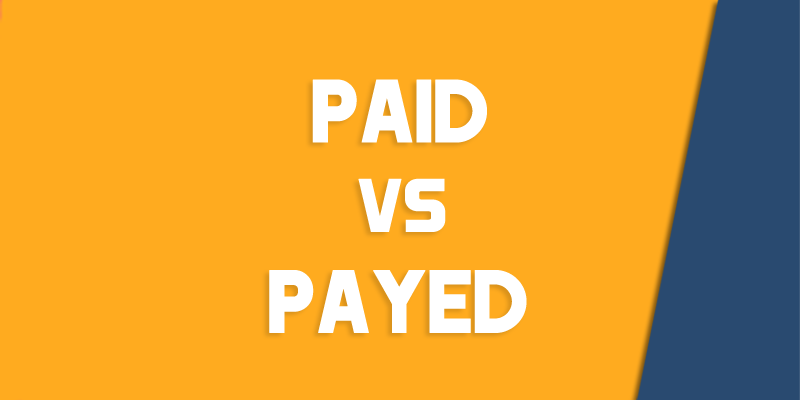Paid vs. Payed – What’s the Gist?
Of these two words, if you want the past tense of pay, only one of them is correct.
- Payed does not function as a past tense form.
- Paid is a past tense verb.
The word pay has an irregular verb form. Contrary to what you might think, to form the past tense of pay, you do not use an –ed suffix.

How to Use Paid in a Sentence
Paid definition: As mentioned, the word pay is an irregular verb. The three principal parts are pay (present), paid (past), have paid (past participle).
Pay functions as a transitive verb, meaning to return for services rendered; to hire for money; to fulfill a debt.
For example:
- The employer pays his employees every two weeks. (Present Tense Verb)
- After completing the installation of the patio, the contractor was paid. (Past Tense Verb)
- The managers have paid all the employees. (Present Perfect Tense Verb)
Additionally, the word paid functions an adjective, indicating as being marked by the receipt of payment, or having been paid for.
For example:
- One of the employee’s benefits is receiving paid sick time. (Adjective)
- Alex Trebek is a paid endorser for Colonial Penn life insurance. (Adjective)
Paid is either a past tense transitive verb, or it acts an adjective.
How to Use Payed in a Sentence
Payed definition: Although it is sometimes applied as the past tense of pay, using payed for paid is not correct.
That being said, there is a sense in which payed can be correct. In nautical terms, payed is the past tense of pay, meaning to use pitch as a seal to prevent leaks.
For example:
- To make the boat seaworthy, a sailor payed the open creases between the planks with hot tar. (Past Tense Verb)
Avoid using the word payed for paid.
Outside Examples of Payed vs. Paid
- I believe that the work of a stay-at-home parent is very valuable. They keep the house clean and care for the children which is a very important role in a family, but I don’t believe they should get payed [read paid]. –The New York Times
- It turns out that was a blatant lie. Between June and August of 2018, the Friess campaign payed [read paid] The Trafalgar Group LLC $98,000 for “consulting” services, with the final payment coming just days after the poll in question was completed. –The Casper Star Tribune
- The donations enabled Buttigieg’s campaign to swell to hundreds of paid staff and compete against his higher-profile and well financed opponents, but also marred his image as the Midwestern mayor-next-door after images leaked of a posh campaign fundraiser in a Napa Valley wine cave. –The San Diego Union-Tribune
- In an attempt to protect future front-runners, the RNC sanctioned a limited number of debates in 2016 — a move establishment Democrats supporting Hillary Clinton were happy to follow. The problem is that voters often make decisions based on what they see of the candidates in authentic, unscripted moments; that’s why campaigns value earned media so much more than paid media, and why the debates are do-or-die events. –The Washington Post
In the first two bullet points directly above, the usage of payed was incorrect.
Phrases That Use Payed and Paid
Unsurprisingly, there are not any phrases for the word payed. While there are a couple of phrases that use the word paid, there are many idioms for the word pay, including:
I’ve paid my dues: By putting in the time, someone has earned the right to some perks.
- When the teacher was asked to take lunch duty, she refused, replying: “I’ve paid my dues.”
Paid in full: Someone has rendered complete payment.
- The receipt for the furniture was stamped: “Paid in full.”
Pay (one’s) respects: The act of expressing well wishes or to offer condolences.
- She attended the funeral to pay her respects to the family.
Robbing Peter to pay Paul: A figure of speech, meaning taking money designated for something and putting it toward something else.
- The senior citizen had to rob Peter to pay Paul when he took the money for his medicine to pay the heating bill.
How to Remember These Words
The best way to remember to pick the correct spelling of the past tense of pay is to look at the letter i in the word paid. Relate it to the personal pronoun I by saying that I have to make sure that people get paid.
For example:
- I paid the bills this month.
- I want to get paid this month.
Although you might be tempted, refrain from using the past tense nautical term payed to mean that you have rendered payment. If you don’t, you might be tarred and feathered with that pitch from the ship by the grammar police.
Article Summary
Is payed or paid correct? The confusion lies with which word is the correct spelling for the past tense of pay. As an irregular verb form, it is paid and not payed.
Think of it this way: most of us want to get paid and not played.
- Payed is not the past tense form for pay.
- Paid is the past tense form of pay.
